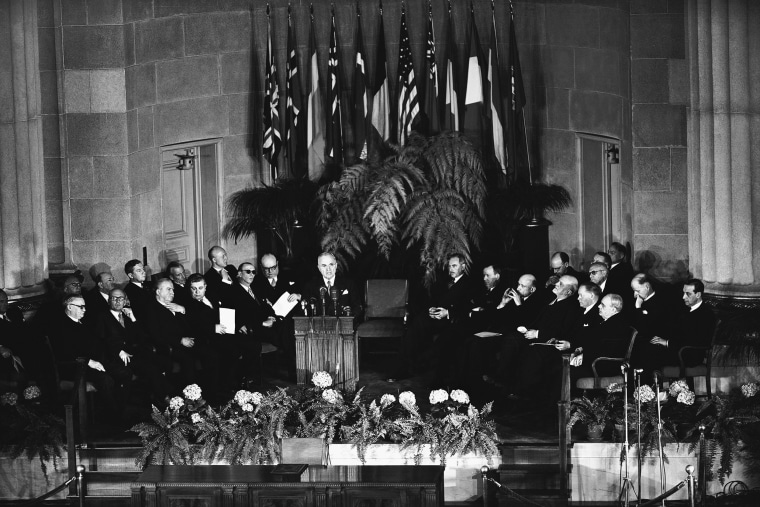My grandfather Harry S. Truman, who was sworn in as president after the death of President Franklin D. Roosevelt, had inherited a worldwide catastrophe. Although World War II would end in the first four months of his presidency, as the leader of the most powerful country on Earth, he faced an enormous challenge to rebuild the war-ravaged world. “Boys, if you ever pray, pray for me now,” he told the White House press corps on April 13, 1945, the day after his tenure began.
Rebuilding the economies of former World War II allies and enemies alike while countering Soviet expansionism and preventing a third world war became Truman’s primary foreign policy objective.
The empires that had shaped the global order for centuries were crumbling. Much of Europe and Asia lay in ruins, ravaged by starvation and economic collapse. And a new global threat, communism, was on the rise. Rebuilding the economies of former World War II allies and enemies alike while countering Soviet expansionism and preventing a third world war became Truman’s primary foreign policy objective: “I want peace and I’m willing to fight for it.”
After he was elected to the presidency in 1948, my grandfather’s first major act was to direct the State Department to open negotiations for a trans-Atlantic alliance. Thus was born the most significant result of Grandpa’s foreign policy strategy — America’s membership in the North Atlantic Treaty Organization (NATO).
When 12 countries signed the treaty in Washington, D.C., on April 4, 1949, Truman said, “We hope to create a shield against aggression and the fear of aggression.” Truman created the postwar order.
As we commemorate the 75th anniversary of the largest peacetime military alliance in the world, we find ourselves in a position that my grandfather would recognize. Totalitarianism is on the rise. Democracy and peace are under attack. A mobilized Russia, under the dictatorial Vladimir Putin, is waging war against Ukraine and is once again threatening Europe. NATO, America and democracy itself are under attack.
NATO, whose founding mission is to safeguard the freedom and security of all its members, has endured these 75 years, no matter the political or military threats to democracy. But as Grandpa liked to say, nothing in history is either foreordained or permanent. The question we should ask now is not whether NATO is necessary, but how we can ensure the alliance’s influence for the next 75 years.

Grandpa was a dedicated student of history. He was also a proud veteran — and the only president to serve in combat in World War I. He knew the sacrifices of war and the importance of creating and preserving peace.
Protecting the peace was a bipartisan effort in 1949. Shifting American foreign policy from isolationism to internationalism could not be done by the president alone. As a Democrat, Grandpa’s friendship with key Republicans in the Senate and his recognition of the importance of bipartisan governance paved the way for an easier than expected approval of NATO by Congress on July 21, 1949. The Senate ratified the treaty by a vote of 83-13.
Protecting the peace was a bipartisan effort in 1949.
Truman and then-Secretary of State Dean Acheson signed the Instrument of Accession on July 25, 1949, making the United States a founding member of NATO. Grandpa also put America’s money where its mouth was when, three months later, he signed the Mutual Defense Assistance Program, which appropriated $1.4 billion to build Western European defenses.
NATO and the other elements of Truman’s postwar arsenal largely kept the peace throughout the Cold War until 1989, when the Berlin Wall fell and the Iron Curtain was lifted. Since then, NATO has grown to include 32 members, including several former Soviet bloc states, and continues to protect democracy and perpetuate peace.
As NATO turns 75 and presidential candidates, politicians and pundits weigh the merits of international leadership and alliances, I am reminded of Grandpa’s most important warning: “We can well afford to pay the price of peace. Our only alternative is to pay the terrible cost of war.”